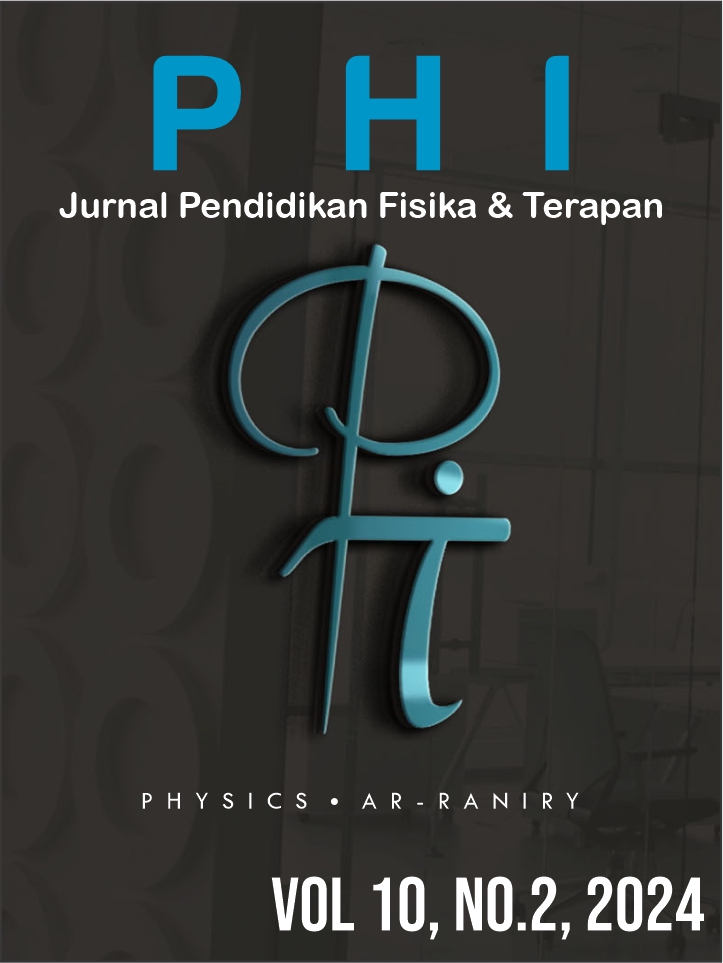Analysis of Students Analytical and Intuitive Thinking Skills in Series and Parallel Teaching Aids
DOI:
https://doi.org/10.22373/p-jpft.v10i2.22949Keywords:
Intuitive Thinking, Analytical Thinking, Teaching Aids, Series Circuit, Series ParallelAbstract
Thinking is a process in which a person recalls existing knowledge from their memory and uses it to receive, process, and conclude information. Intuitive thinking is part of the logical aspect that develops a person's ability to analyze problems spontaneously, quickly, and accurately. Analytical thinking is a systematic or structured thinking activity that can effectively identify problems to be faced. The researcher used a qualitative method with a descriptive type. In this research stage, the researcher used test instruments in the form of essay test questions. The subjects targeted in this study were 6 students. The results of the study showed a comparison of the students' thinking skills: out of 6 students, 4 had intuitive thinking skills amounting to 67%, and 2 had analytical thinking skills amounting to 33%. The conclusion of this study is that students are more dominated by intuitive thinking skills than analytical thinking skills.
References
Diana Nur Septiyawati Putri, Islamiah F, Andini T & Marini A, 2022. Analisis Pengaruh Pembelajaran Menggunakan media Interaktif Terhadap Hasil Belajar Siswa Sekolah Dasar. Jurnal Pendidikan Dasar dan Sosial Humaniora, Vol. 2(2), 363-374.
Haizatul Faizah, Rahmat Kamal, 2024. Belajar dan Pembelajaran. Jurnal Basicedu, Vol. 8(1), 466-476.
Helen Purnomo, Hadi Soekamto, Alfyananda Kurnia, Didik taryana, 2023. Efektivitas Model Geographical Inquiry Learning Terhadap Kemampuan Berpikir Analitis Ditinjau dari Minat Belajar Siswa. Jurnal Ilmiah Pendidikan Profesi Guru, vol. 6(3), 467-480.
Marinu Waruwu, 2023. Pendekatan Penelitian Pendidikan: Metode Penelitian Kualitatif, Metode Penelitian Kuantitatif dan Metode Penelitian Kombinasi (Mixed Method). Jurnal Pendidikan Tambusai, Vol. 7(1), 2896-2910.
Nuraini F, Agustiani N & Mulyanti Y, 2023. Analisis Kemampuan Berpikir Komputasi Ditinjau dari Kemandirian Belajar Siswa Kelas X SMK. Jurnal Pendidikan Matematika, Vol. 7(3), 3067-3082.
Rina Dwi Muliani dan Arusman, 2022. Faktor yang Mempengaruhi Minat Belajar Peserta Didik. Jurnal Riset dan Pengabdian Masyarakat, Vol. 2(2), 133-139.
Satria Ikhlasul Amal adan, 2023. Pentingnya Motivasi Belajar Dalam Meningkatkan Hasil Belajar Siswa. Jurnal Pendidikan dan Pengajaran, Vol. 1(2), 78-86.
Sintya Bela, Rina Marlina, 2024. Proses Berpikir Konseptual Siswa SMP Ditinjau Dari Perbedaan Kecemasan Matematis. Jurnal Pembelajaran Matematika Inovatif, Vol. 7(2)
Slamet Susanto, 2023. Pengembangan Alat dan Teknik Evaluasi Tes dalam Pendidikan. Jurnal Tarbiyah Jamiat Kheir, vol. 1(1)
Wilem Rilaxen SP Mulder, Nur Khoiri, Muhammad Syaipul Hayat, 2023. Validitas Media Pembelajaran IPA Berbasis Web dengan Pendekatan STEAM Untuk Meningkatkan Kemampuan Berpikir Kreatif Peserta Didik. Jurnal Praktisi Pendidikan, Vol. 2(1), 11-17.
Downloads
Published
Issue
Section
License
Authors who publish with Jurnal Phi agree to the following terms:
- Authors retain copyright and grant the journal right of first publication with the work simultaneously licensed under a Creative Commons Attribution License (CC BY 4.0) that allows others to share the work with an acknowledgment of the work's authorship and initial publication in this journal.
- Authors are able to enter into separate, additional contractual arrangements for the non-exclusive distribution of the journal's published version of the work (e.g., post it to an institutional repository or publish it in a book), with an acknowledgment of its initial publication in this journal.
- Authors are permitted and encouraged to post their work online (e.g., in institutional repositories or on their website) prior to and during the submission process, as it can lead to productive exchanges, as well as earlier and greater citation of published work (See The Effect of Open Access).

















